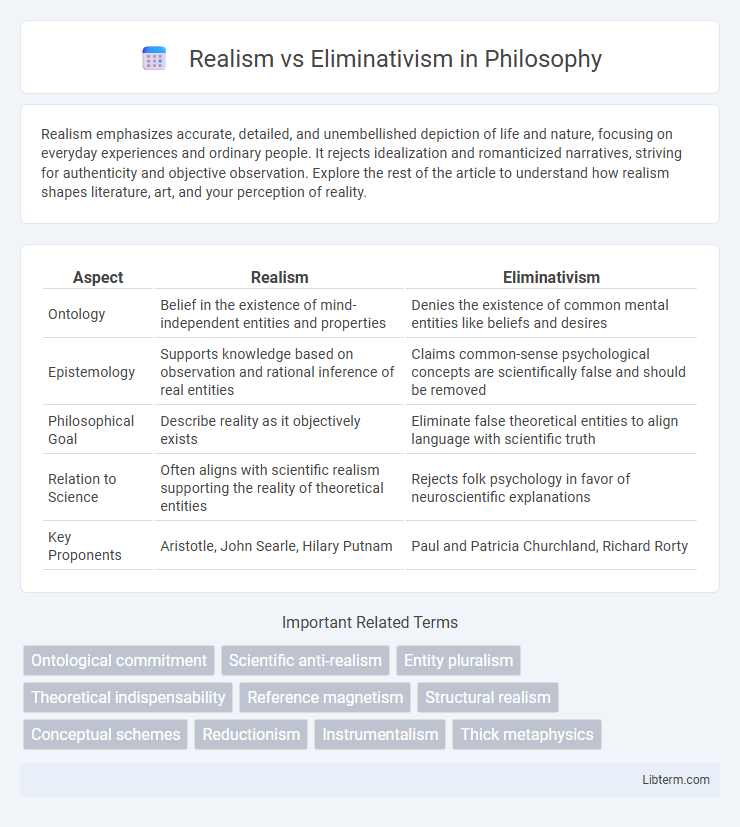Realism emphasizes accurate, detailed, and unembellished depiction of life and nature, focusing on everyday experiences and ordinary people. It rejects idealization and romanticized narratives, striving for authenticity and objective observation. Explore the rest of the article to understand how realism shapes literature, art, and your perception of reality.
Table of Comparison
| Aspect | Realism | Eliminativism |
|---|---|---|
| Ontology | Belief in the existence of mind-independent entities and properties | Denies the existence of common mental entities like beliefs and desires |
| Epistemology | Supports knowledge based on observation and rational inference of real entities | Claims common-sense psychological concepts are scientifically false and should be removed |
| Philosophical Goal | Describe reality as it objectively exists | Eliminate false theoretical entities to align language with scientific truth |
| Relation to Science | Often aligns with scientific realism supporting the reality of theoretical entities | Rejects folk psychology in favor of neuroscientific explanations |
| Key Proponents | Aristotle, John Searle, Hilary Putnam | Paul and Patricia Churchland, Richard Rorty |
Introduction to Realism and Eliminativism
Realism asserts that entities described by our best scientific theories genuinely exist and accurately represent reality, grounding knowledge in observable or theoretical facts. Eliminativism challenges common-sense mental constructs like beliefs and desires, arguing these concepts should be discarded because they lack a clear, scientific basis. This debate centers on whether everyday mental states correspond to actual phenomena or are misleading folk psychological constructs.
Defining Key Concepts: Realism
Realism asserts that entities described by scientific theories exist independently of our beliefs or perceptions, grounding knowledge in objective reality. It holds that terms and concepts in scientific discourse correspond to actual objects or phenomena in the world. This position contrasts with eliminativism, which denies the existence of certain theoretical entities, arguing they should be discarded as obsolete or erroneous.
Understanding Eliminativism
Eliminativism challenges traditional realist views by denying the existence of certain mental states as commonly understood, asserting that folk psychology concepts like beliefs and desires are scientifically untenable. This philosophical position argues that future neuroscience will eliminate these outdated concepts in favor of more accurate, empirical explanations of brain processes. Understanding eliminativism involves recognizing its radical stance on mental phenomena, contrasting sharply with realism's acceptance of mental states as real entities.
Historical Background and Philosophical Roots
Realism in philosophy, rooted in ancient Greek thought and prominently developed by Aristotle, asserts that universals and external objects exist independently of human perception. Eliminativism, emerging in the late 20th century within philosophy of mind debates, challenges the existence of certain mental states as scientifically invalid constructs, tracing its roots to materialist and positivist traditions. Both perspectives reflect deep concerns about the nature of reality and the validity of common-sense ontology, shaping ongoing discussions in metaphysics and epistemology.
Core Arguments for Realism
Realism asserts that mental states, such as beliefs and desires, are genuine aspects of reality and can be scientifically studied, opposing eliminativism's claim that these concepts will be discarded by future neuroscience. Core arguments for realism emphasize the explanatory power of folk psychology in predicting and understanding human behavior, which eliminativism fails to replicate. Realists argue that mental states have causal efficacy and are indispensable for making sense of subjective experiences and social interactions.
Core Arguments for Eliminativism
Eliminativism argues that common-sense mental states like beliefs and desires are fundamentally flawed and should be discarded because they do not correspond to any actual neurological processes. Neurophilosophers emphasize that advances in cognitive neuroscience reveal that folk psychology is an inaccurate and outdated framework for explaining human cognition. This position advocates replacing traditional mentalistic terms with scientifically grounded descriptions to achieve a more accurate understanding of the mind.
Major Debates and Controversies
The debate between Realism and Eliminativism centers on the existence and nature of mental states, with Realists asserting that beliefs and desires are genuine, causally efficacious phenomena, while Eliminativists argue these folk psychological concepts are fundamentally flawed and should be discarded in favor of neuroscientific explanations. Controversies arise over the ontological status of propositional attitudes, the explanatory power of folk psychology, and the viability of reductionist approaches to the mind. Key figures such as Paul Churchland and Jerry Fodor highlight disagreements about whether mental states can be seamlessly integrated into scientific ontology or must be eliminated as mere theoretical relics.
Impact on Science and Philosophy
Realism supports the existence of theoretical entities and scientific truths as mind-independent, fostering robust scientific inquiry and philosophical analysis grounded in objective reality. Eliminativism challenges the existence of certain theoretical constructs, advocating for the removal of concepts deemed scientifically obsolete, which reshapes scientific paradigms and prompts a reevaluation of philosophical frameworks. The tension between these positions influences the development of scientific theories, the interpretation of empirical data, and the conceptual foundations of philosophy of science.
Contemporary Perspectives and Developments
Contemporary perspectives on realism versus eliminativism emphasize advances in cognitive science and philosophy of mind, challenging traditional ontological commitments by questioning the existence of common-sense mental states like beliefs and desires. Developments in neuroimaging and computational modeling support eliminativist claims that folk psychological concepts may be scientifically obsolete, while refined realist positions defend a nuanced account of mental phenomena grounded in empirical data. Current debates increasingly explore integrative frameworks that reconcile mental state attributions with neuroscientific findings to align ontological commitments with contemporary epistemic standards.
Conclusion: Future Directions and Implications
Realism and eliminativism debate the ontological status of mental states, with realism affirming their existence and eliminativism denying it based on neuroscientific advances. Future directions involve integrating empirical findings from cognitive science and neuroimaging to refine or challenge traditional mentalistic concepts. Implications for philosophy of mind, artificial intelligence, and clinical psychology hinge on reconciling subjective experience with objective neural data to develop coherent models of consciousness and cognition.
Realism Infographic

 libterm.com
libterm.com